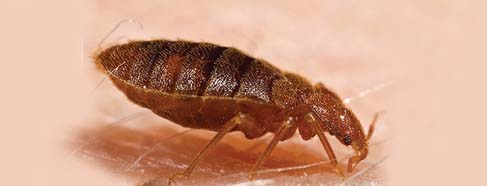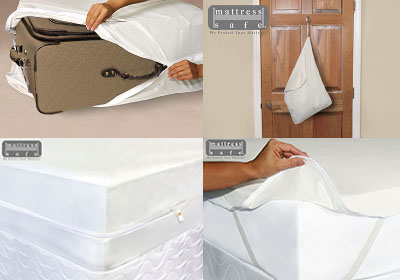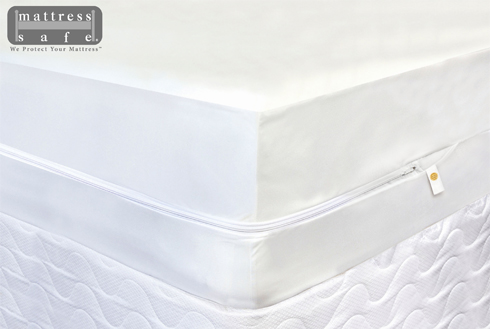Categories
Categories
- Home
- BedBugFAQs
Unfortunately, the incidence of bed bugs is occurring at an increasing rate within the United States. Business travelers, vacationers and multi-family dwelling residents are at risk to encountering bed bugs and the bed bug threat has spread to include common locations that people might not normally suspect. Industry experts report that bed bugs may be encountered in places such as airline planes, various forms of mass transit, health care facilities, hotels, resorts, senior citizen facilities, libraries, and other places.
Below Mattress Safe® has presented Frequently Asked Questions regarding bed bugs to help our customers better understand and prepare themselves opposite the bed bug problem. These FAQs have been written by a pest management consultant who is experienced in resolving bed bug situations and who recommends the use of high quality mattress encasements as an important part of a sound bed bug management program.
The Mattress Safe® Team hopes that none of our customers encounter or suffer the consequences of a bed bug infestation but we stand ready to assist you with information and high quality products to better enable you to battle this most invasive and troublesome pest.
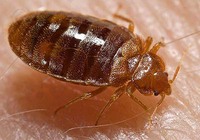
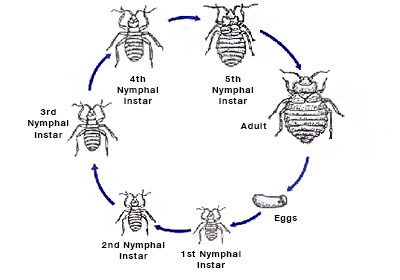
1. What are bed bugs?
Bed bugs are small insects that feed exclusively on blood. They wait in hidden places and emerge to get a blood meal from their sleeping host then return to their hiding place.
2. What do bed bugs look like? How can I recognize bed bugs?
There are several photos of bed bugs that may be seen online if you search "bed bugs" under "images" on either Google or Yahoo. Bed bugs can grow up to about 3/8 of an inch long. They start out as appearing whitish and translucent but take on a rusty red color after taking a blood meal.
3. How can I detect bed bugs?
Bed bugs can be difficult to find even for experienced professionals. However, the signs of bed bug activity may be easier to find. Bed bugs leave signs or evidence of their presence that are easier to find once you know what to look for. This evidence or tell tale signs include fecal stains, eggs, shed skins and carcasses. This evidence of bed bugs may be found on surfaces where bed bugs hide including mattresses, box springs, headboards, bed frames, night stands and other places.
4. How can I tell if we have bed bugs in our home?
Bed bugs are difficult to detect in the early stages. In my opinion, it's rare that a person who unknowingly brings bed bugs home from a trip will discover that he/she did so until they begin to notice that they are bitten and the problem is already established in their own home.
5. Where do bed bugs hide?
Bed bugs can hide in the smallest of places in just about anything. In addition to the normal places you'd expect to find them such as beds, mattresses, box springs, bed frames, head boards, etc.; we've also found them in places including night stands, clock radios, lamps, shoes, wall hangings, speakers, stereo components, computers, desks, artificial floral arrangements, curtains, wall outlets, moldings, door frames, crutches, artificial limbs, pet bedding, toys, plush toys/stuffed animals, clocks, potted plants, furniture, under carpets, fire alarms, telephones, just about everywhere. Just because bed bugs are capable of hiding "just about anywhere" that doesn't mean that they will be "everywhere" within your home. Up until the point that the problem grows to become a "bed bug ground zero" type location, it is likely that the bed bugs will be found in areas "close to the food" in your home which, in reality, is you!
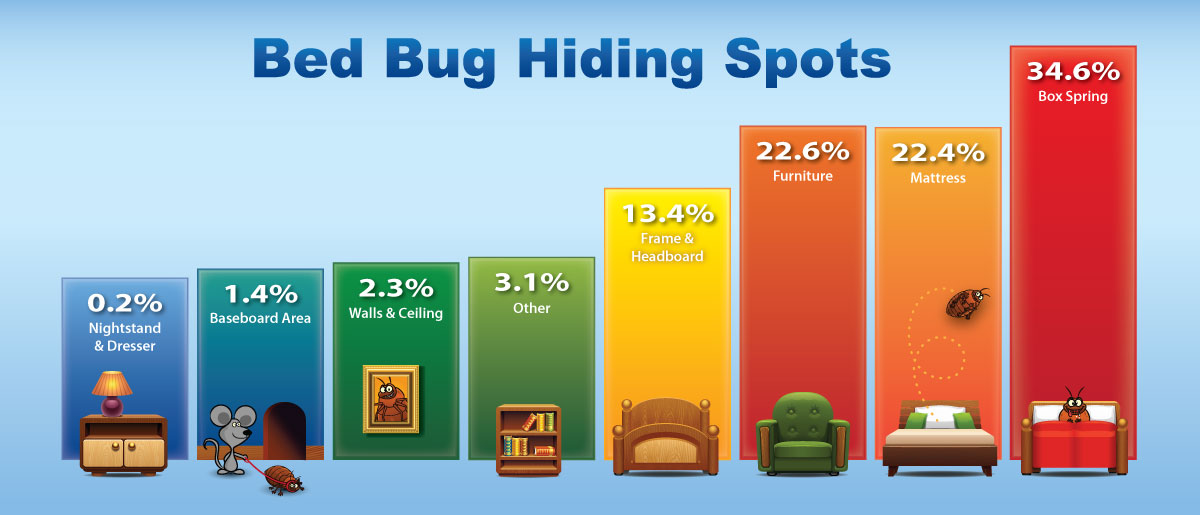
6. How do people get bed bugs?
People get bed bugs from being at places where bed bugs are. Bed bugs are "hitch-hikers" and largely dependent upon man to travel from place to place. One of the common ways people get bed bugs in their homes may be from traveling and staying at a place where bed bugs were already present. Bed bugs can climb into luggage or other belongings and are then inadvertently brought home. It's also possible to carry bed bugs to other locations or for bed bugs to travel in from a neighboring room, unit or apartment.
7. What sort of places have you seen bed bug problems occur?
Wow, the list of places that the pest management industry has been called in to handle bed bug problems is long and disconcerting. Bed bugs can be anywhere that man is and they have been so, let's leave it at that as we don't wish to unnecessarily alarm anyone.
8. How do bed bugs bite?
Much like mosquitoes, bed bugs suck blood from their host victims. All ages of bed bugs and both sexes of bed bugs bite and need blood to develop and survive. These blood meals are sucked in through the piercing sucking mouthparts at the "north end" and later on are expelled out the south end as a dark ink like appearing fecal liquid. This fecal liquid creates the stains that may be found in areas where bed bugs travel and hide.
9. Can people feel the bite and how will I know I've been bitten?
While it may be possible to feel a bed bug crawl on your skin, possibly as it contacts a hair, it is unlikely that you will actually feel a bed bug biting you. It's doubtful that you will actually feel a bed bug bite happening. Bed bugs make their living by being "stealthy". That is, they need to sneak in, find a suitable place to bite, stick in their piercing mouthparts, suck your blood and sneak away. If you could feel them do this, you'd wake up and simply squish the bed bug. Like mosquitoes, bed bugs inject an anti-coagulant and an anesthetic so you won't feel the bite and the blood flows.
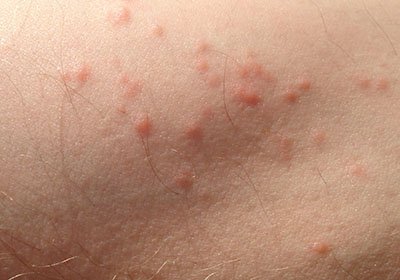
10. What do bed bug bites look like?
People may react to bed bug bites differently and the bites may appear differently on different people. Generally speaking, bed bug bites appear as raised reddened bumps or welts on the skin that are usually itchy. However, some people do not react to bed bug bites. You can search "bed bug bites" under images on Google or Yahoo to see additional photos of bed bug bites online.
11. Can my doctor identify bed bug bites?
Your medical doctors or dermatologist may not know about bed bugs. Medical doctors may not have been trained in medical entomology and, even at best, insect bites can be difficult to detect or diagnose accurately. We once had a woman who was an intensive care nurse who had experienced bed bugs for nearly two years before she discovered that she, in fact, had a bed bug problem. This woman has been to her general practitioner and was later referred to a dermatologist. She had received prescriptions and treatments for dry skin, psoriasis, seborrhea, dermatitis, scabies and other skin related maladies over the course of those many months when her actual problem was bed bugs.
12. If bed bugs bite in a similar fashion as mosquitoes, do bed bugs transmit diseases?
In some laboratory studies certain disease organisms have been associated with bed bugs however, at the time of this writing, there is no conclusive evidence that bed bugs are capable of transmitting disease.
13. How often do bed bugs feed?
Bed bug feeding frequency is dependent upon local conditions. Generally, bed bugs do not need to feed every day and can go a long time without feeding. Bed bugs can last a long time without feeding. Some references indicate bed bugs can survive about one year without feeding. It is not necessary for bed bugs to feed every day or every week. They can "lay in wait" for the next host for surprisingly long periods of time. Of course we are dealing with live entities and longevity is based upon local conditions. As such, your mileage may vary.
14. I'm a frequent business traveler, what can I do to avoid bed bugs?
I've seen bed bugs in all types of hotels. The quality of a hotel is not as important as who may have stayed in the room previously. While there's no guarantee that you'll never encounter bed bugs during business or vacation travel, the following steps may help to prevent picking up bed bugs during your travels:
After checking in, enter your room just far enough to close the door behind you and your luggage and keep the luggage there. Using a suitable flashlight, check the mattress, box spring, head board and behind the head board for signs of bed bugs. If you see any signs of bed bugs, take your luggage with you to the front desk and ask to be placed in another room. Some experts advise travelers to ask the front desk person if they have ever had a pest problem or if there is an existing pest problem within the hotel. Use large plastic bags to seal your belongings inside such that bed bugs may not be able to crawl into your luggage or use Mattress Safe® SuitcaseSafe® Luggage Encasements. The SuitcaseSafe® is a portable durable encasement that protects your luggage from a bed bug invasion providing an added layer of protection from bed bugs. At home use suitable high quality mattress encasements or covers such as those by Mattress Safe® to seal bed bugs in and take away the multiple hiding places on your mattress and box spring. 15. How will I know if I'm staying in a bed bug free hotel?
The short answer is you won't. You can ask but my experience is that they will generally tell you an answer that indicates that they've never had a bed bug situation. I've asked such questions at locations that I've known have had or are experiencing bed bug situations and this is the sort of reply that I've consistently received. If you do have a concern or suspicion it may be wise to go ahead and ask your question and be mindful of how your question is answered.
15. How will I know if I'm staying in a bed bug free hotel?
The short answer is you won't. You can ask but my experience is that they will generally tell you an answer that indicates that they've never had a bed bug situation. I've asked such questions at locations that I've known have had or are experiencing bed bug situations and this is the sort of reply that I've consistently received. If you do have a concern or suspicion it may be wise to go ahead and ask your question and be mindful of how your question is answered.
16. How do I get rid of bed bugs?
Do not underestimate them; bed bugs take a lot of knowledge, experience, time and effort to get rid of. For the most part, I strongly recommend that folks who have bed bugs in their homes hire a professional to deal with the bed bug problem.
17. Can I get rid of bed bugs myself?
It's possible but it takes a lot of work, knowledge and experience expended over an extended period of time. Most folks are much better off leaving bed bug control to a competent pest professional.
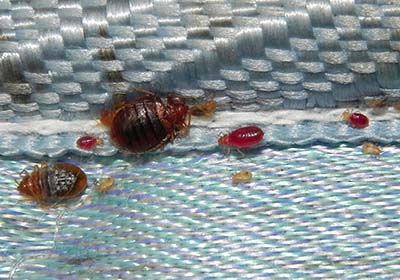
18. What's the secret to get rid of bed bugs?
There is no secret or shortcut to getting rid of bed bugs. While if caught early on it can be much easier to take care of, the normal experience is that once a person notices that she/he has bed bugs, the problem can be advanced such that a lot of inspection and control work is necessary to rid the property of bed bugs. The real secret is that the control work needs to be very thorough to assure that no bed bugs can escape the control program and the property can be rendered "bed bug free".
19. Can I get bed bugs from my neighbor?
Yes, you can. Hungry bed bugs seek out their hosts. They are attracted to heat, carbon dioxide and other factors given off by their victims. It's possible that bed bugs can find their way from room to room and apartment to apartment through many available pathways.
20. We live in an apartment. The neighboring apartment has a bed bug problem, what should we do?
If you suspect that the neighboring apartment has a bed bug problem this does not necessarily mean that your apartment will get bed bugs. However, it is possible that bed bugs can travel from apartment to apartment by various means so you are wise to be concerned. Contact the apartment company/landlord to express your concerns, find out what they are doing about the bed bug situation, find out what they are doing to assure that they prevent a problem from getting into your apartment and maintain a level of increased vigilance opposite bed bugs. If after doing this you have continued questions and concerns, be persistent and make decisions in your best interest to avoid bed bugs.
21. How long does it take to get rid of bed bugs?
Generally, the timing of successful results depends on the situation. While some infestations may be successfully resolved in a relatively short time, others may be more complex or difficult to solve. Professionals report that most bed bug situations take multiple service visits and may take up to several weeks to control.
22. What is the best method to get rid of bed bugs?
Pest control professionals are currently using many methods to control bed bugs. These methodologies include the use of heat, steam, rapid freezing, the application of pesticides and fumigation. While all of these methods have been proven effective, bed bug control work presents unique challenges that make successful control difficult. Unfortunately, there are currently no "silver bullets" for bed bug control and if a control program you're being sold sounds too good to be true, it probably is.
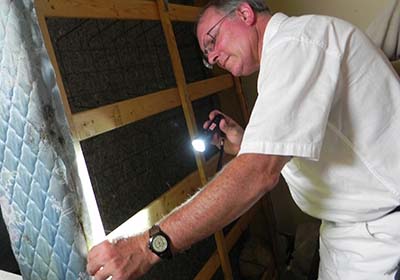
23. Where do I find a bed bug professional and how do I know I'm hiring a competent bed bug professional?
Pest management professionals may be found online or in your local phone book. Here are a few things to consider when searching for a reliable and reputable bed bug management professional: they are properly licensed and insured in your state or local, they are members of their trade association, they have a good training program for their service technicians, they have service technicians with many years of experience, they have positive references from your community, they send at least two technicians to do the bed bug work (to do a thorough job furniture, mattresses, box springs, etc. must be moved requiring two people), they have a sound and well organized bed bug control program that makes sense to you and they are willing to stand behind their work.
24. How do I know if I am hiring a good pest management company to get rid of my bed bugs?
There are thousands of pest management companies in the United States but few who specialize in bed bug control. The bed bug problem is growing in the United States and, as a result, the pest management industry is becoming increasingly effective at handling bed bug problems. A good bed bug company will have a sound bed bug management program. Their program will be thorough and "make sense" to you. They will stand behind their work. They will send at least two technicians to do the work. They will provide you with information on how to prepare for the bed bug management work. They will provide you with sound bed bug information. They will answer your questions.
25. My house has been treated for bed bugs, what should I do now?
Be careful to utilize all the preventative techniques and follow the directions provided to you by your pest management professional. Maintain a heighten level of vigilance during the time of your treatment process to enhance the results of the bed bug control program.
26. My apartment company has a pest control provider, should I hire my own to take care of my apartment?
Generally speaking, you are able to hire a pest professional to take care of pest situations within your own apartment at your own expense and, because you hire them yourself, they work directly for you and may provide you with superior service. However, contact your landlord company and ask questions about the bed bug services being provided by their pest professional before you make a decision on what's best for you.
27. Can't I simply wrap my mattress and box spring in plastic rather than by an expensive mattress encasement?
Yes you can and I have seen folks do this in the field. However, these plastic wraps tend to rip thus providing no protection to the mattress or box spring from bed bugs. Additionally, if you have ever slept on plastic you probably you found it very uncomfortable. In the field I have seen folks take desperate measure opposite their bed bug problems. I've seen them wrap their beds in plastic and shower curtains but these plastic covers usually rip and we need to make sure that we have 100% coverage. The Mattress Safe® encasements are well built, tested bed bug proof, dependable, comfortable to sleep on and widely available.
28. Hey, that's a lot of bed bug information. It seems like you know all there is to know about bed bugs?
Whoa, hold on there. Field experience has well taught me that none of us know "all there is to know" about most things, especially bed bugs. Each day presents additional opportunities for all of us to learn more about bed bugs, new stuff is being discovered and developed every day.
29. Where can I find additional reliable information about bed bugs?
There is a lot of information available online. Generally, I recommend that folks review the information found on unbiased web sites including university based web sites, medical school websites and others. You can do a search on bed bugs and find many references to learn more about bed bugs. The more you know, the better able you are to make good decisions.
On behalf of the Mattress Safe® Team, we hope that the information provided above is of help to you in your quest to maintain a pest and bed bug free home. If you are concerned about bed bugs be on the constant search for increasing your knowledge and experience opposite bed bugs and the successful management of bed bugs. No one deserves to suffer the inconvenience, agony and deleterious affects of life with bed bugs!
*Source: Paul J. Bello - Certified Entomologist, PJB Pest Management Consulting, LLC.
Mattress Safe® Quality You Can Trust... Service You Deserve®
Mattress Safe® Product Features | Video (1:52)
The Mattress Safe® product collection includes quality mattress and box spring encasements and protectors for any bed in your home. Featuring our soft luxurious fabric, Mattress Safe® encasements are bed bug certified to protect against bed bugs. Mattress Safe® products are waterproof, breathable, fire retardant, and soft to the touch.
Easy Care and Installation Instructions | Video (0:56)
Products by Mattress Safe® are used daily around the world for bed bug protection, allergy relief and waterproof protection. Mattress Safe® products are handmade of long-lasting materials that stretch to fit. Our products are specially designed for ease of installation. Installation instructions are provided with each product.
Why Mattress Safe® Is Bed Bug Certified | Video (1:13)
Mattress Safe® mattress protectors and encasements are your first line of defense against bed bugs, fluids, stains, bacteria and mold. Mattress Safe® encasements are the only products on the market that are bed bug certified. Don't settle for lesser encasements that claim "bed bug protection". Get the proven gold standard: Mattress Safe® Bed Bug Certified.
 Loading... Please wait...
Loading... Please wait... 
